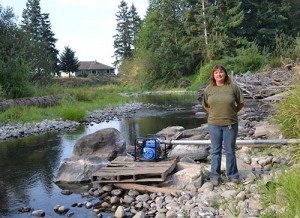
By Kristine Thomas
Melody Harpole of Harpole’s Produce in Silverton describes this summer as the “tomato summer.”
“The hot, dry weather makes it a good summer to grow tomatoes,” she said. “When we have rainy, cloudy summers, it’s harder for the tomatoes to ripen.”
Harpole, 39, has learned from her years farming that the weather goes in cycles, some years hot and dry and other years, rainy and cloudy. There are pluses and minuses to each cycle. Knowing the weather patterns helps her determine what kind of crops to plant, even down to the variety of the tomato.
“This summer, a lot of farmers have said it’s more labor intensive moving irrigation pipes so they can water their crops,” she said, adding with the shortage of water, some farmers have been cut off from drawing water from creeks to irrigate.
Harpole farms two pieces of property, one near the Gallon House Bridge that borders Abiqua Creek and the other where she has her produce stand, 8071 Mount Angel Highway, NE, Silverton. Her family’s water rights on the Abiqua date to the 1940s.
Harpole said there have been days when the creek has been dry and other days where the water has been barely a trickle. On Aug. 12, the water was higher than Harpole has seen it in awhile.
“It’s because no one is running their pumps to irrigate,” she said.
Her farm near Mount Angel Highway is irrigated by well water.
“My well is fine. I have heard of a lot of people whose wells are running dry,” she said. “But we irrigate one of properties from the Abiqua. When it stops flowing, as it has at times this year, I can’t irrigate. I believe that we will have to replace a dozen fruit trees that were planted this year because of that.”
In Stage One, residents are
encouraged to conserve water by:
Watering on even and odd days.
For example, if your house number
is 513, water on days numbered, 1, 3, 5.
If your house number is even, you water
on even days, 2, 4, 6, etc.
Water at dawn, dusk or early morning
and late evening to avoid evaporation.
Make sure watering is hitting the lawn
and not the sidewalk.
Check for leaks around the house and
outside water faucets.
Try shorter showers, using gray water
for watering, flushing less often.
Conservation tips can be found at the
city’s website, www.silverton.or.us
From straw-colored lawns to exposed rocks in creek beds, water has been a hot topic this summer.
At the Silverton City Council meeting on Aug. 3, former councilor Scott Walker told the council members that he is concerned about the future of water.
“It’s been a hot summer and all anyone is talking about is water,” Walker said. “There’s hardly any water in the creek.”
He encouraged the council to begin investigating ways to store water, such as underground reservoirs. He also expressed concern about the snow pack being less in the winter and the need to collect and store rain from the fall and winter months.
Silverton Public Works Director Paul Eckley gave the council an update on how the city’s Stage 1 Voluntary Water Curtailment was working.
At a special meeting on June 22, the council voted to activate Stage 1 of Voluntary Water Curtailment.
Eckley said on July 28, Marion County went from moderate to severe drought.
Last summer, Eckley said Silverton residents were using 2.1 million gallons per day. This year, he said, residents are using 2.2 million gallons per day. Both numbers are based on a seven-day average, he added.
“I know a lot of people have complained about us using all the water in Abiqua but there is still water going over the dam,” he said.
Silverton’s water system is not dependent on snow melt, but rather rainfall.
The city’s main water source is Abiqua Creek, followed by Silver Creek and the Silverton Reservoir. The city’s dam at Abiqua Creek was built in the 1940s and is gravity fed. Water from Silver Creek has to be pumped, and a new pump installed this month.
The city has the first water right on the Abiqua, dating back to Jan. 25, 1917. He said the city’s water rights on Silver Creek go back to the 1940s.
At the city monitoring station below the dam, the water is flowing at 230 gallons a minute, Eckley said. Last September, it was flowing at 150 gallons a minute.
Silverton City Manager Bob Willoughby said it appears the Stage 1 Voluntary Water Curtailment is working “and we may not have to go to Stage 2,” which is enhanced voluntary conversation and curtailment. Stage Three is mandatory restrictions.
The city manager has the authority to activate Stage 2 or Stage 3 water curtailments.
Eckley said when it comes to the weather, “we are not magicians. We can’t predict if we will have to use water from Silver Creek. It all depends on if we get rain or not. We are keeping a close eye and monitoring the situation.”
Editor’s note: What has your experience been with the drought this summer? Has your well gone dry? What have you done to conserve water? If you are a farmer, what changes have you made? What concerns do you have? Please send an email to [email protected] if you would like to share your story or concerns.
